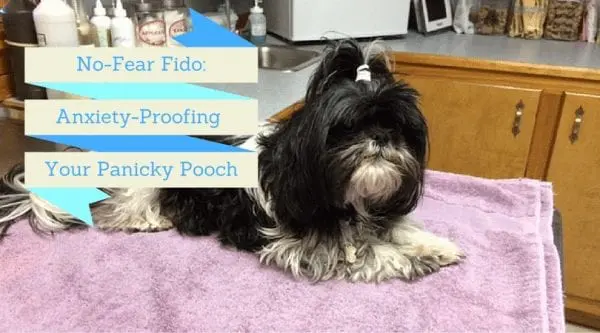No-Fear Fido: Anxiety-Proofing Your Panicky Pooch

Do you own a “‘fraidy dog?” You know – a dog that’s scared of practically everything? While it’s normal for dogs to be afraid of some things, having a dog that’s overly fearful is not normal. Here’s what you can do to help a dog lead a normal and happy life. Keep reading for Anxiety-Proofing Your Panicky Pooch tips.
Symptoms Of Fear
Mild fears, and certain signs like tail-tucking, trembling, withdrawal, hiding, reduced activity, and passive escape behaviors might be something to worry about. Definitely monitor the situation and make sure that your dog’s behavior doesn’t get worse. Panic-inducing behaviors include active escape behavior, increased out-of-context aggressive behavior, or injurious motor activity.
A classic sign of sympathetic autonomic nervous system activity includes diarrhea. And, signs of anxiety, like lesions secondary to anxious behavior, like licking or biting self should be taken seriously. This is a dog that is under severe stress and needs professional help.
Causes Of Distress
Treat distress, anxiety, and behavioral disorders like an illness. Any illness or painful physical condition increases anxiety and contributes to the development of fears, anxiety, and phobias that may not be easily solved without the help of a professional trainer or dog psychologist.
Puppies are cute, happy, and lovable. But they can also be frustrating and annoying. Puppies need a lot of attention and patience. They can bark a lot, eat your furniture, and forget their house training manners. And sometimes they can be very stressed especially if they are left alone for a good amount of time. If that happens instead of calling the vet look into alternative ideas for puppy stress relief.
Many times, dogs that are deprived of social interaction and socializing as pups suffer from anxiety and behavioral disorders as they get older. These are very difficult to correct once embedded in the dog’s psychology.
Going To The Vet
Your veterinarian will want to rule out other conditions that could be causing the weird behavior. For example, many vets will want to run tests to rule out brain or thyroid disease. Some behaviors could also originate from a response to a toxic substance that the dog accidentally ate.
If the diagnosis is fear, anxiety, or a phobia, the vet might prescribe medication to help you deal with it. Of course, this is a short-term solution.
The long-term solution is to help the dog see his or her self-esteem and build it up. This can be very long process. It’s not as fast as aggression rehabilitation and definitely not as easy as medicating the dog. But, medication always carries with it side effects. And, your dog will never be “normal” and healthy under medication.
In fact, many dogs become different animals, psychologically. You may not recognize the dog.
Rehabilitation
To start off, you should practice obedience training. If you’re having trouble getting started, hire a professional dog trainer in NJ to help you.
You want your dog to get good at recognizing and obeying your commands, like “sit,” “stay,” “come,” “down,” and “no.”
With every success and every positive reinforcement, comes more self-esteem. It builds over time. And, eventually, you may end up with the dog you had always hoped for. But, a lot depends on your willingness to be consistent, hire the right trainers, and your ability to be patient.
Expect rehabilitation to take up to a year, or more. In some cases, it’s an ongoing process that lasts years. Depending on the severity of the problem, you may have lifelong training and rehabilitation in front of you.
That doesn’t mean that each day will be a struggle. But, you may have to make adjustments and monitor your dog’s behavior and attitudes day to day.
Skye Watson is known as the dog-whisperer amongst her friends and family. She just seems to have a special connection with dogs that she can’t easily explain. Skye is currently at veterinary school and writes for pet websites and magazines in her spare time.








